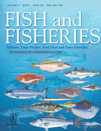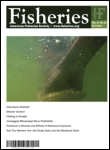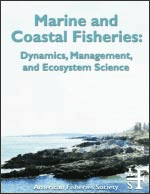
FISH AND FISHERIES
Scope & Guideline
Innovating research for thriving aquatic ecosystems.
Introduction
Aims and Scopes
- Ecological and Biological Research:
The journal publishes studies exploring fish biology, including growth, reproduction, nutrition, and behavior, contributing to a deeper understanding of fish species in both wild and farmed environments. - Aquaculture Innovations:
Research on various aquaculture practices, including the use of alternative feeds, breeding programs, and sustainable farming techniques, is a core focus, enhancing productivity and sustainability in fish farming. - Fisheries Management and Policy:
The journal addresses issues related to fisheries management, including stock assessments, population dynamics, and the socio-economic impacts of fishing practices, providing insights for policymakers. - Environmental Impact Studies:
Research assessing the effects of environmental factors on fish populations, including climate change, pollution, and habitat degradation, plays a significant role in understanding and mitigating threats to aquatic ecosystems. - Technological Advances:
The journal covers advancements in technologies related to fishery science, such as genetic analysis, remote sensing, and modeling tools, which are crucial for contemporary fisheries research.
Trending and Emerging
- Sustainable Aquaculture Practices:
Research focusing on sustainable aquaculture practices, such as biofloc technology and integrated multi-trophic aquaculture, is gaining traction as the industry seeks to minimize environmental impacts. - Climate Change Impacts on Fisheries:
There is an increasing emphasis on understanding how climate change affects fish populations, habitats, and fisheries management, reflecting global concerns about environmental change. - Nutritional and Health Aspects of Fish Farming:
Studies exploring the nutritional requirements and health management of farmed fish are trending, especially regarding alternative feeds and disease management strategies. - Socio-economic Factors in Fisheries:
Research examining the socio-economic dimensions of fisheries, including the impacts of fishing on local communities and livelihoods, is emerging as a critical area of inquiry. - Technological Integration in Fisheries Research:
The use of advanced technologies such as GIS, remote sensing, and molecular techniques is on the rise, indicating a trend towards more precise and data-driven approaches to fisheries research.
Declining or Waning
- Traditional Capture Fisheries:
Research focusing solely on traditional capture fisheries seems to be declining, possibly due to increasing emphasis on aquaculture and sustainability practices. - Basic Taxonomic Studies:
Although essential, the frequency of papers dedicated to basic taxonomic studies may be waning as the field shifts towards applied research with immediate implications for management and conservation. - Static Aquaculture Systems:
There is a noticeable decrease in studies centered around static aquaculture systems, with a growing trend towards dynamic and integrated systems that promote sustainability and resource efficiency.
Similar Journals

FISHERIES
Pioneering insights into the ecological and socioeconomic dimensions of fisheries.FISHERIES, published by WILEY, stands at the forefront of aquatic science and nature conservation, providing a vital platform for researchers and practitioners to share their findings and contribute to the sustainable management of global fishery resources. With an impressive impact factor and recognition within its field, the journal is currently ranked Q2 in both Aquatic Science and Nature and Landscape Conservation categories as of 2023, indicating its significant influence and quality of research dissemination. Covering a broad scope of topics from aquatic ecosystems to conservation strategies, FISHERIES facilitates cross-disciplinary discourse essential for understanding the ecological and socioeconomic aspects of fisheries. As the journal converges its years of operations from 1976 to 2024, it continues to adapt to emerging challenges in the field, making it an invaluable resource for professionals, researchers, and students alike who are dedicated to advancing knowledge and practices in sustainable fisheries management.

FISHERIES SCIENCE
Advancing aquatic science for sustainable fisheries.Fisheries Science, published by Springer Japan KK, is a renowned journal in the field of aquatic science, effectively bridging the gap between scientific research and practical application in fisheries management. With an ISSN of 0919-9268 and an E-ISSN of 1444-2906, this journal serves as a vital resource for researchers, professionals, and students interested in advancing their knowledge and understanding of aquatic ecosystems and fishery practices. Operating within a competitive landscape, Fisheries Science has achieved a respectable ranking in Scopus, placing 96th out of 247 journals in the Agricultural and Biological Sciences > Aquatic Science category, showcasing its integral role in contributing to this dynamic field. The journal encompasses a wide range of topics from sustainable development to conservation strategies, aiming to foster collaborative research and innovative solutions to the challenges facing fisheries today. While not an open-access journal, Fisheries Science remains a key publication for those dedicated to marine science and the sustainable management of aquatic resources, with a historical footprint extending from 1994 to 2024.

ACTA ICHTHYOLOGICA ET PISCATORIA
Exploring the depths of ichthyology and fisheries.ACTA ICHTHYOLOGICA ET PISCATORIA is a distinguished peer-reviewed journal dedicated to the field of ichthyology and fisheries science, published by PENSOFT PUBLISHERS since its establishment as an open-access publication in 1970. Based in Poland, this journal serves as an essential platform for researchers, professionals, and students aiming to contribute to the scientific understanding of aquatic life. With an impressive H-index reflecting its growing influence, ACTA ICHTHYOLOGICA ET PISCATORIA is currently ranked in the Q3 quartile within both the Animal Science and Zoology and Aquatic Science categories. According to Scopus, it holds a rank of #227 in Animal Science and Zoology and #147 in Aquatic Science, demonstrating its relevance and contribution to these fields. The journal’s commitment to open access ensures that research findings are widely disseminated, fostering collaboration and knowledge sharing among the scientific community. With a historical scope extending from 1996 to 2024, ACTA ICHTHYOLOGICA ET PISCATORIA remains a vital resource for advancing aquatic research and fostering new insights into the complexities of fish biology and fisheries management.

REVIEWS IN FISH BIOLOGY AND FISHERIES
Exploring the intricacies of fish biology and sustainable fisheries.Reviews in Fish Biology and Fisheries, published by Springer, is a prestigious journal dedicated to advancing our understanding of fish biology and the principles underpinning fisheries science. With an impact factor reflective of its high citation rate and its recognition as a Q1 category journal in Aquatic Science, it ranks impressively at #9 out of 247 in the Scopus database, placing it within the top 4% of its field. Established in 1991, this journal serves as a crucial platform for researchers, professionals, and students alike, offering comprehensive reviews and insights that foster innovation and collaboration in aquatic research. Although it is not available as an open-access publication, its rigorous peer-review process ensures the dissemination of quality research that informs policy and practices in fisheries management globally. With a diverse range of topics covered, the journal is an essential resource for anyone aiming to deepen their knowledge and impact in the dynamic fields of fish biology and fisheries.

Marine and Coastal Fisheries
Advancing sustainable practices in marine ecosystems.Marine and Coastal Fisheries, published by Wiley, is a leading open access journal that has been dedicated to advancing the field of fisheries science since its inception in 2009. With an esteemed Q1 ranking in Aquatic Science and a Q2 ranking in Ecology, Evolution, Behavior and Systematics as of 2023, the journal actively contributes to the understanding and management of marine and coastal ecosystems.
This journal serves a diverse audience ranging from researchers and practitioners to students, providing a platform for high-quality peer-reviewed articles that address contemporary challenges in fisheries management and conservation. With a commitment to global accessibility, Marine and Coastal Fisheries promotes the dissemination of scientific knowledge to enhance sustainable practices in marine environments, making it an essential resource for those invested in the health of aquatic ecosystems. To explore the latest research and insights, visit the journal's website and engage with the thriving community of marine science professionals.

Turkish Journal of Fisheries and Aquatic Sciences
Enhancing biodiversity through impactful aquatic studies.Turkish Journal of Fisheries and Aquatic Sciences, published by the CENTRAL FISHERIES RESEARCH INST, is a key resource in the fields of Fisheries and Aquatic Sciences, catering to a global community of researchers and professionals. With its ISSN 1303-2712 and E-ISSN 2149-181X, this journal offers an engaging platform for the dissemination of high-quality research from Turkey, covering critical topics within Animal Science and Aquatic Science. As a third quartile journal in both categories (Q3, 2023), it provides valuable insights, contributing to a growing body of literature that addresses aquatic ecosystems, fisheries management, and biodiversity conservation, thereby enhancing the sustainability of aquatic resources. The journal has shown considerable impact, ranking 144th in Animal Science & Zoology and 116th in Aquatic Science within Scopus, reflecting its relevance and credibility within the academic community. Operating from 2008 to 2024, it invites open access submissions to foster collaboration and knowledge sharing among scientists, students, and practitioners alike, reinforcing its dedication to advancing the science of aquatic ecosystems.

INDIAN JOURNAL OF FISHERIES
Empowering fishery professionals with cutting-edge research.Welcome to the Indian Journal of Fisheries, an esteemed publication of the Central Marine Fisheries Research Institute, dedicated to advancing the field of aquatic sciences. Established in 1974, this journal serves as a crucial platform for researchers, professionals, and students interested in the dynamics of fishery research within the Indian context and beyond. With an impact factor highlighting its rigorous peer-review standards, the journal publishes research that significantly contributes to the understanding of fisheries management, conservation, and sustainable practices. Although currently categorized in Q4 for Aquatic Science (2023) and ranked #215 out of 247 in Scopus, its increasing visibility demonstrates the journal's dedication to enriching the scientific discourse surrounding aquatic ecosystems. Located in Kochi, India, and published intermittently from 1977 to 2024, it seeks to bridge knowledge gaps while promoting innovative methodologies in fishery sciences. While not an open-access journal, it fosters a vital exchange of scholarly work that informs fishing practices, policy, and ecological considerations vital to both national and global fisheries. Join us in exploring the intricate world of fisheries through our comprehensive collection of research articles, reviews, and case studies.

Journal of Ichthyology
Advancing Knowledge in Aquatic SciencesJournal of Ichthyology, published by PLEIADES PUBLISHING INC, is a respected periodical in the field of aquatic sciences and biological studies, focusing extensively on the study of fish and their ecosystems. With an ISSN of 0032-9452 and E-ISSN of 1555-6425, this journal serves as an essential platform for researchers seeking to publish innovative findings related to ichthyology and broader aquatic biological sciences. Although currently not an open-access journal, its high relevance is reflected in its impact factor and varied audience, addressing pressing issues in biodiversity, conservation efforts, and fish biology. The journal's classification indicates a Q3 ranking in Agricultural and Biological Sciences and a Q4 ranking in Aquatic Science for 2023, affirming its contributions to the field despite its percentile standings in Scopus ranking. The journal has a publication history that spans critical converged years from 1976 to 2024, making it a vital resource for ongoing research developments and scholarly discourse. For academics, professionals, and students alike, the Journal of Ichthyology remains a key resource for advancing knowledge and enhancing the understanding of fish biology and their ecological impacts.

Fishes is a premier academic journal dedicated to the exploration and dissemination of cutting-edge research in the fields of aquatic science and ecology. Published by MDPI in Switzerland, this open-access journal has been accessible to researchers globally since its inception in 2016, allowing for the rapid exchange of knowledge that fosters scientific advancement in the study of fish and aquatic ecosystems. With its convergence in the years 2016 to 2024, Fishes proudly holds a notable position in the academic community, evidenced by its category quartile rankings of Q3 in Aquatic Science and Q2 in Ecology for 2023. The journal consistently features innovative research encompassing ecological interactions, conservation strategies, and evolutionary studies within aquatic environments. By integrating interdisciplinary approaches and encouraging contributions from a diverse array of experts, Fishes serves as an invaluable resource for researchers, professionals, and students alike, contributing to the understanding and preservation of our precious aquatic biodiversity.

CANADIAN JOURNAL OF FISHERIES AND AQUATIC SCIENCES
Advancing aquatic science for a sustainable future.The Canadian Journal of Fisheries and Aquatic Sciences, published by Canadian Science Publishing, stands as a premier interdisciplinary journal dedicated to advancing knowledge in the fields of aquatic sciences, ecology, and evolutionary biology. With a longstanding history of publication since 1980, this journal delivers high-quality, peer-reviewed research that contributes to the understanding of aquatic ecosystems and the sustainable management of fisheries. The journal is esteemed for its rigorous standards and currently holds a Q1 ranking in both Aquatic Science and Ecology, Evolution, Behavior, and Systematics as of 2023, evidencing its significant impact in these critical areas. Researchers, professionals, and students alike can expect compelling explorations of both fundamental and applied aspects of aquatic sciences. While the journal offers traditional access, it remains committed to disseminating pivotal research findings to foster a vibrant community of scholars and practitioners striving towards innovative solutions for aquatic environmental challenges.